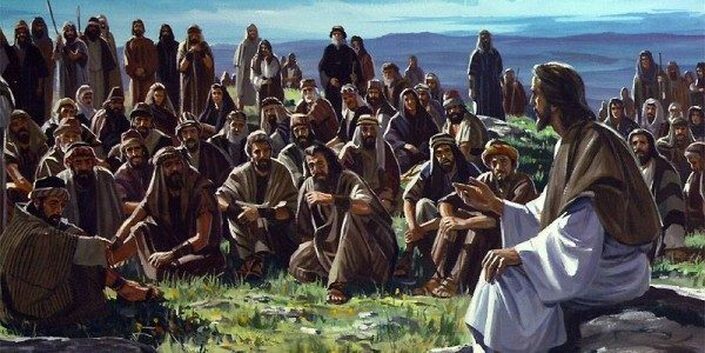|
Matthew 5:17-19 (NRSVCE) “Do not think that I have come to abolish the law or the prophets; I have come not to abolish but to fulfill. For truly I tell you, until heaven and earth pass away, not one letter, not one stroke of a letter, will pass from the law until all is accomplished. Therefore, whoever breaks one of the least of these commandments, and teaches others to do the same, will be called least in the kingdom of heaven; but whoever does them and teaches them will be called great in the kingdom of heaven." We come into the Sermon on the Mount today just after the Beatitudes. Jesus has already challenged our prejudices by proclaiming all those things “Blessed” that we associate with things cursed: the poor, the meek, the mournful, and the hungry. But now he is about to do something much more than merely upend our biases. He is speaking to a crowd full of Jews, who live under the strict confines of the Law, and telling them that he is not here to free them from that burden. He is here to bring the demands on the Law to new levels. He is here to demand more.
What follows is multiple examples of what he means by this. The Law says “You shall not murder.” But Jesus says if you are even angry with your brother, you are liable to judgment. The Law says you shall not swear falsely. But Jesus says you shall not swear at all, for everything you could swear by belongs rightly to God. To swear by anything, then, is to swear by God, calling on Him to vouch for your truth. As Romano Guardini says in The Lord, “[Jesus] no longer draws the line between right and wrong, true oath and false, but much sooner: between divine truth and human truth. How can man, who is full of untruth, place himself with his testimony beside God, the Holy One? Thus the commandment forbidding perjury is supplanted by a far profounder general love of truth, which does not swear at all because it knows and loves God’s holiness too well to associate it with any personal testimony.” [1] Over and over Jesus does this. “You have heard it said…” and “But I say to you…” Jesus takes what the Law demands, and challenges us to do more. While the Pharisees are overcome with piety in their rigorous enforcement of a strict adherence to the letter of the Law, Jesus tells us that they are not doing enough. Unless you are better than the Pharisees, you will never enter the kingdom of heaven. But he is not merely referring to the Pharisees and their piety here. He is also referring to how the Law had been perverted, how the Law, which is from God, was taken possession of by man. Instead of working to place the hand of God on the people in everything they did, man took the Law and used it as a measuring stick for his own glory and his own power. The Pharisees and the scribes claimed authority because they had the Law. Jesus says in response that the Law is not yours to have, nor do you even understand the Law you claim to begin with. By their perversion of the Law, Jesus was to be killed (John 19:6-7). It was so perverted that they claimed divine authority to kill God’s own Son. This was not from God. This was the result of man. Jesus comes to not only set things right, but to raise them to new heights. He comes to subvert, but also to elevate. He comes to teach and demand of us the holiness the Pharisees claimed but would never achieve. He teaches true holiness. He has not come to abolish, but to fulfill. [1] Guardini, Romano. The Lord. Part 2, Chapter 1 |
ArchivesCategories
All
|

 RSS Feed
RSS Feed